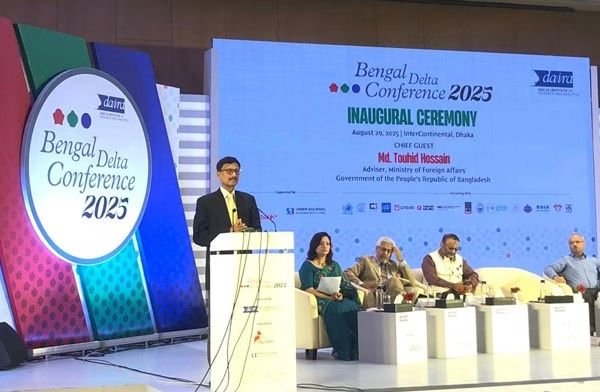The student-led uprising on July 24 has paved the way for a renewed commitment to democratic practices in Bangladesh, with the country now heading toward a historic democratic power transfer process.
The observations were made by speakers at the inaugural session of the two-day Bengal Delta Conference organised by Dhaka Institute of Research and Analytics (Daira) at a hotel in the capital on Friday.
Foreign Affairs Adviser Md. Towhid Hossain, in his keynote address, emphasised that Bangladesh is determined not to revert to its previous political system. “I hope the youth will remain politically aware of this matter,” he said.
Former Malaysian Minister of Education, Professor Mazli Bin Malik, stated that the popular uprising had revived Bangladesh’s democratic culture. He lauded the government for engaging in dialogue with various stakeholders during decision-making processes, calling it a very positive step. “The decisions made in the aftermath of the popular uprising will not only serve Bangladesh but will also be considered a litmus test for the progress of any nation globally,” he remarked.
Siddhartha Vardarajan, founding editor of the Indian news outlet The Wire, pointed out that Bangladesh is reconsidering its economic future. “The country is walking the path of making new history. The success Bangladesh has had in dealing with US-imposed tariffs on both India and itself is a clear sign of the nation’s economic transformation,” he said.
Vardarajan highlighted that recent negotiations under the leadership of the trade adviser had successfully reduced the US tariff on Bangladesh to a more manageable level.
Mahfuz Anam, editor of The Daily Star, reflected on Bangladesh’s repeated struggles to create a strong institutional framework since the Liberation War. “Despite repeatedly dreaming of progress, we failed to build a robust state system, leading to the collapse of our dreams,” Anam said. “However, we have once again stood up against autocratic systems and dared to dream again.”
He acknowledged that past uprisings, while inspiring new hopes, were marred by internal divisions. “The July 24 uprising has reignited a sense of hope in the people,” Anam added.
Dr. Deepak Gawali, former Minister of Nepal, focused on the significance of climate change and urged Bangladesh’s youth, who were part of the uprising, to also consider the global impact of climate change in their aspirations for a new Bangladesh.
The event was also attended by Dhaka University Vice Chancellor Professor Niaz Ahmed Khan.


